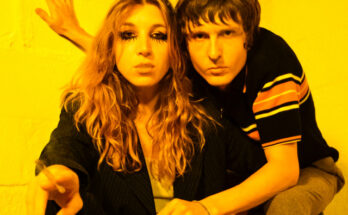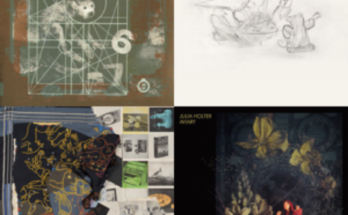The idea of a band using a computer program to help arrange their songs may strike many “rockists” and those desperately clinging to traditional songwriting as a little slice of impersonal, easily dismissed gimmickry. Portland, Oregon’s Menomena, Justin Harris on bass, Brent Knopf on keyboards and vocals and Danny Seim on drums, needn’t involve themselves in any inane pissing contests with aging nostalgia-mongers, though. The sounds emanating from their accomplished debut, I Am The Fun Blame Monster, speak for themselves and should swiftly silence all those dullards who would question the band’s veracity.
Menomena is a band whose unique ideas about music have birthed an album that defies easy categorization. Simple, haunting piano lines snake around complex rhythms. Ethereal harmonies are drug back to earth by fluid, ominous bass and unremitting, rock-steady drums, only for both to be shattered by a ragged guitar line or a violent burst of noise. Songs abruptly start and stop, always threatening to fall apart or fade away. In lieu of verses and choruses, elements are unpredictably cycled in and out of the mix. The simplest of musical elements are built up into adrenalized crescendos. It’s a type of music that draws on subtle elements of hip-hop, electronica and of course rock ‘n’ roll, but in all reality, the darkly sinuous nature of Menomena’s music is without precedent.
“It all happened in the fall of 2000,” relates bassist Harris, “Danny and I were in a band before this one for five years. Brent had seen that band play four years prior and Danny and he became friends. He (Brent) went to college and kept in touch. He was graduating in 2000 and coming back home to live.” And so was the genesis of Menomena.
The band formed around a very interesting concept, though. A major component of their writing process is a simple computer program, written by Knopf, known as Deeler. “The first time I heard of Deeler was about two years before the band formed. Brent was writing a program … more or less trying to make it for a live application so that you could pull off a one- man band live,” says Harris, “All it is, is a program that has 10 tracks of recording that interface with whatever program you’re using to record.” These 10 tracks each contain five files in which to store; sounds, the tempo, phrase length, etc. can be changed. This sets off a click track that records automatically and by itself, beginning on the downbeat of whatever is next played into the track. The effect is that of a song looping itself spontaneously, “You end up with a big conglomeration of parts that sort of all fit together,” describes Harris.
All of this tedious methodology wouldn’t amount to much more than sound and fury and monotony if it weren’t for the human element of the band that allows them to sculpt the raw material of a Deeler session into the luminous hypnotism of a Menomena composition. “We take it to Pro-Tools and somebody arranges it,” explains Harris, “…Whoever does the mixing, it sort of takes on the character of that person’s aesthetic.”
Whether it is the result of man or machine, one of the most striking things on first listen is the band’s taut, insistent rhythms. Harris states, “When we’re using Deeler each song usually starts with a drum beat, so everything is sort of written around a different beat.” The liquid bass guitar and multifarious drum work simultaneously drives along and grounds the eerie melodies and wraithlike piano and organ figures. “Brent adds a lot of the melody; Danny and I are more rhythm-based,” says Harris.
The low end allows for a certain complexity of structure and approach, where the most austere of melodic sequences can fade out into a void just as easily as they can expand into a song’s white-knuckle climax. “It’s the nature of the beast,” claims Harris, “It’s what comes out of making loops, trying to make something out of nothing. In a Deeler session there’s not a lot of change. You do end up with a lot of pieces that are sort of similar, and it does get a little tricky to make that tension work.” Menomena songs eschew verses or choruses, instead expanding and retracting in an organic fashion, discarding or expanding musical ideas seemingly arbitrarily. “Well using these little sound files, one session can last for twenty minutes, trying to build a song out of short loops forces you to do something interesting; otherwise, it can get boring,” comments Harris.
Possibly the most impressive aspect of the Menomena is that a band with such a singular course of action in the studio translates it all to the live arena. “Once one of us arranges it then we have to learn how to play it live or pick and choose which parts best represent the character of the song,” states Harris. He goes on to say that, “I personally prefer playing live; I enjoy playing live; the energy is different … Us in the studio isn’t what a typical band in the studio sounds like; we all have certain ideas, different ideas for the same thing. We all feel a little more relaxed and able to break out of some of the restrictions of the studio.” This enthusiasm comes through on stage as well. Menomena are somewhat renowned for an energetic live performance far removed from the subdued intensity of the album. “It’s more up-tempo, quite a bit faster,” states Harris, “we don’t try to mimic the album, but we’re not like a jam band, beating a part to death for five minutes.”
So after self-releasing their debut in 2003, and releasing it nationally via FILMguerrero in 2004 after much well-deserved hubbub from the underground, the obvious question is when are Menomena fans going to hear more Menomena? “This last album took us the good part of a year. A lot of those songs took a long time to develop.” Still, rumor has it that a few new songs have popped up during their last tour. As far as the process of developing them goes, Harris says, “We end up using a lot of elements, past Deeler sessions, we have tons of them, just tons and tons of files. The great part is you can go back a few weeks later, and they’ll sound completely different, you’ll hear something you didn’t hear before.”
Everything about Menomena, from their non-linear methods of songwriting right down to the cover of their album, which is in fact a peculiarly humorous flipbook of the band playing their instruments, challenges many of the ingrained, macho assumptions about rock music. One feels that even without Deeler or any other embellishments, Menomena would still be crafting their idiosyncrasies into music. As Harris observes, “We’re all very interested in, and sort of sticklers for, aesthetics in general. Why make something mediocre? We just get ideas and/or wild hairs and just try to implement them as best we can.”



